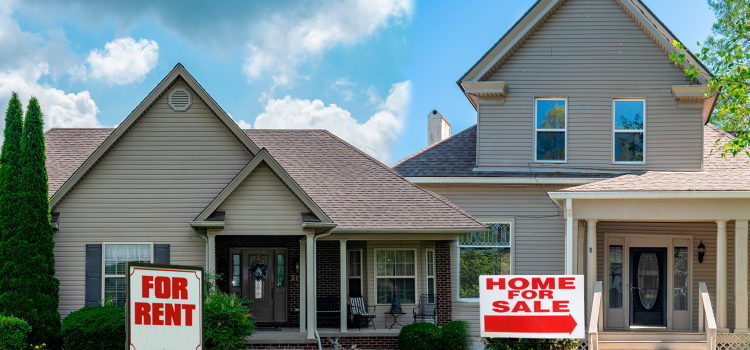
Introduction
Are you in the midst of the age-old dilemma – should you rent or buy your next home? This decision isn’t just about walls and a roof; it’s a significant choice that can shape your financial future and lifestyle. In this extensive guide, we’ll dive deep into the pros and cons of both renting and buying, equipping you to make an informed decision that aligns with your financial goals and personal preferences.
Evaluating Your Financial Landscape
Before we jump into the renting vs. buying debate, let’s take a moment to assess your financial situation:
Renting: The Pros and Cons
| Aspect | Pros | Cons |
|---|---|---|
| Financial | Lower upfront costs | No wealth accumulation |
| Flexibility | Easier to relocate | Limited control over property |
| Maintenance | Minimal maintenance responsibilities | No equity buildup |
| Stability | Fixed monthly costs | Subject to rent increases |
| Investment | No property appreciation | Miss out on potential property appreciation |
Buying: The Pros and Cons
| Aspect | Pros | Cons |
|---|---|---|
| Financial | Building equity | Higher upfront and ongoing costs |
| Flexibility | Control over property | Limited flexibility to move |
| Maintenance | Property appreciation | Responsibility for maintenance and repairs |
| Stability | Stable housing costs | Property value fluctuations |
| Investment | Investment potential | Market risk and property management |

Considering Your Lifestyle
Your lifestyle and future plans play a pivotal role in the rent vs. buy decision. Let’s delve into this aspect:
Renting: Embracing Flexibility
If you prioritize mobility and a carefree lifestyle, renting might be your choice. It offers:
- Flexibility: The freedom to move without the burden of selling property.
- Lower Commitment: No long-term financial commitment to a single property.
- Maintenance Relief: Escape the demands of property upkeep.
Buying: Rooted in Stability
If you seek stability and the potential to build equity over time, buying a home could be your path. It provides:
- Ownership: The pride of homeownership and a tangible asset.
- Stability: Predictable monthly payments and a sense of permanence.
- Investment: Potential for property value appreciation.
Crunching the Numbers
Let’s delve deeper into the financial aspect and see how the numbers stack up:
Renting: The Financial Perspective
- Upfront Costs: Lower initial expenses, mainly security deposit and first month’s rent.
- Monthly Expenses: Stable monthly rent, but subject to increases.
- Wealth Accumulation: No equity buildup, rent payments don’t contribute to ownership.
Buying: The Financial Perspective
- Upfront Costs: Higher upfront expenses, including down payment, closing costs, and ongoing mortgage payments.
- Monthly Expenses: Mortgage payments may be stable, but you’re responsible for property taxes, insurance, and maintenance.
- Wealth Accumulation: Building equity with each mortgage payment, potential property appreciation.
The Impact of Market Conditions
The state of the real estate market can significantly influence your decision:
Renting in a Buyer’s Market
- Pros: Negotiate lower rent, more rental options.
- Cons: Potential instability if landlords sell properties.
Buying in a Seller’s Market
- Pros: Property appreciation potential.
- Cons: Competitive buying environment, higher prices.
Your Decision-Making Toolkit
In the end, whether you choose to rent or buy your home should align with your unique financial situation, lifestyle, and the current market conditions. Here are key takeaways to guide your choice:
- Renting is Ideal If: You prioritize flexibility, have a mobile lifestyle, and prefer lower upfront costs.
- Buying is Ideal If: You seek long-term stability, want to build wealth through property, and are prepared for the responsibilities of homeownership.
Remember, there’s no one-size-fits-all answer. Consult with a real estate expert, conduct a comprehensive financial self-assessment, and weigh the pros and cons thoughtfully. Your decision today will shape your financial future tomorrow.
In the end, whether you choose to rent or buy, the most important thing is finding a place you can truly call home.
Renting vs. Buying: A Comparative Overview
| Aspect | Renting | Buying |
|---|---|---|
| Financial Impact | Lower upfront costs, no wealth accumulation | Higher upfront costs, building equity |
| Flexibility | Easier relocation, limited control | Control over property, limited mobility |
| Maintenance | Minimal responsibilities, no equity buildup | Property appreciation, maintenance obligations |
| Stability | Fixed monthly costs, subject to increases | Stable housing costs, property value fluctuations |
| Investment | No property appreciation, miss investment potential | Investment potential, market risks |










